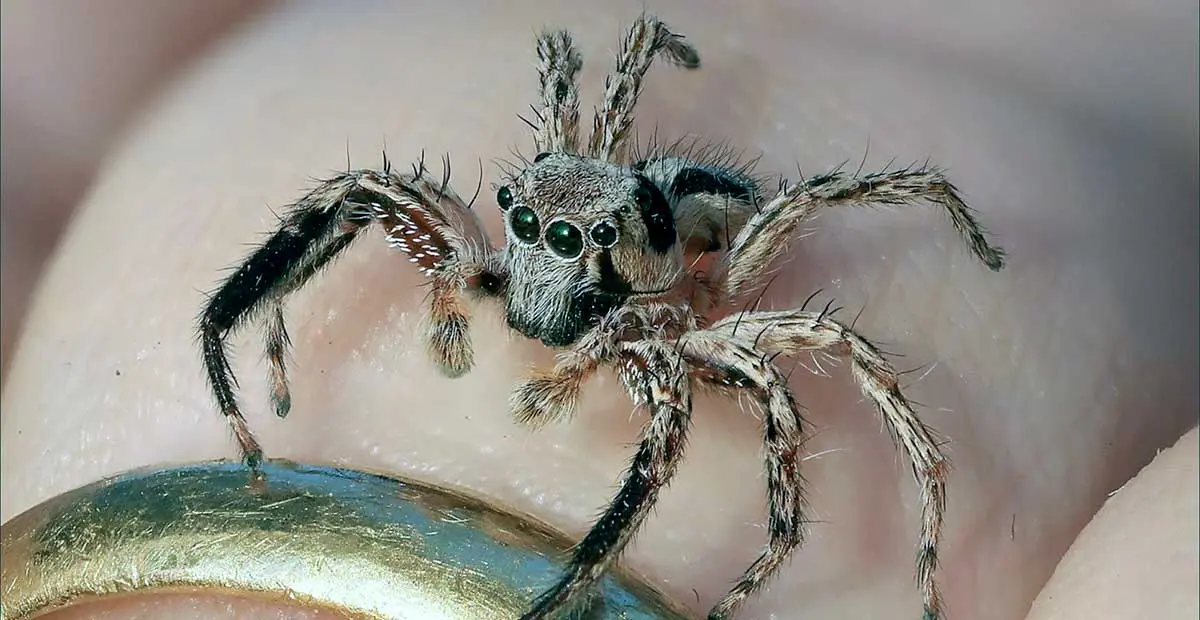You’ve probably seen spiders crawling around your house, garden, or even in your nightmares. But have you ever stopped to think about how smart these little eight-legged creatures actually are? Spiders are often underestimated when it comes to intelligence, but recent research suggests they’re far more clever than we give them credit for. Let’s dive into the fascinating world of spider cognition and uncover some surprising facts.
When we think of spiders, we usually picture them as creepy, crawly creatures that spin webs and eat bugs. But did you know that these tiny beings exhibit behaviors that hint at complex problem-solving skills, memory, and even communication? That’s right—spiders aren’t just mindless predators; they’re incredibly adaptable and resourceful.
In this article, we’ll explore the intelligence of spiders, their unique abilities, and why understanding them matters. Whether you’re a spider enthusiast or just curious about the natural world, you’re in for a treat. So, let’s spin some knowledge and unravel the mysteries behind these fascinating creatures!
Read also:Kyrie Irving Outfit
Table of Contents
- What Are Spiders?
- Spider Intelligence: Beyond the Web
- Cognitive Abilities of Spiders
- Do Spiders Communicate?
- Spider Memory: Remembering the Past
- Problem-Solving Skills in Spiders
- The Role of Webs in Spider Intelligence
- Research on Spider Intelligence
- Common Myths About Spider Intelligence
- Why Understanding Spider Intelligence Matters
- Conclusion: The Smart Side of Spiders
What Are Spiders?
Spiders are arachnids, not insects, and they belong to the class Arachnida. Unlike insects, they have eight legs instead of six, and they don’t have antennae. There are over 48,000 species of spiders worldwide, each with its own unique characteristics. From the tiny jumping spider to the massive Goliath birdeater, these creatures come in all shapes and sizes.
Key Facts About Spiders
- Spiders are carnivorous and mostly feed on insects.
- They produce silk from spinnerets located at the rear of their abdomens.
- Most spiders are solitary creatures, but some species live in colonies.
While many people fear spiders, they play a crucial role in maintaining ecological balance by controlling insect populations. But what about their brains? Are spiders as dumb as they look, or is there more to them than meets the eye?
Spider Intelligence: Beyond the Web
When we talk about spider intelligence, we’re not just referring to their ability to build intricate webs. Sure, web-building is an impressive feat, but spiders also exhibit other forms of intelligence that are worth exploring. For instance, some species can solve puzzles, remember locations, and even learn from experience.
Let’s take the example of jumping spiders. These tiny creatures have been observed solving complex problems, such as finding the shortest route to their prey. They use their keen eyesight and spatial awareness to plan their movements, proving that they’re not just instinct-driven machines.
How Do Scientists Measure Spider Intelligence?
Measuring intelligence in spiders is no easy task. Unlike mammals, spiders don’t have large brains, but that doesn’t mean they lack cognitive abilities. Scientists use a variety of methods to study spider behavior, including:
- Observing their interactions with their environment.
- Testing their problem-solving skills in controlled experiments.
- Studying their neural pathways to understand how they process information.
Cognitive Abilities of Spiders
Spiders may not have the same level of cognitive ability as humans or other mammals, but they possess a surprising range of mental skills. For example, orb-weaving spiders can adjust the tension of their webs based on environmental conditions. This shows that they’re capable of adapting to changes in their surroundings.
Read also:The Actor Bahn La
Memory and Learning
One of the most fascinating aspects of spider cognition is their ability to remember and learn. Studies have shown that certain species can recall the location of their prey and even recognize patterns in their environment. This memory helps them optimize their hunting strategies and improve their chances of survival.
Do Spiders Communicate?
Communication is a vital aspect of intelligence, and spiders are no exception. While they don’t vocalize like humans or other animals, they use other means to interact with each other. For instance, some spiders communicate through vibrations, which they transmit through their webs. These vibrations can convey messages about food, mating, or danger.
Jumping spiders, in particular, are known for their elaborate courtship displays. Males perform intricate dances to attract females, using a combination of visual and vibrational signals. This shows that spiders are capable of complex social interactions, even if they’re not as obvious as those of mammals.
Spider Memory: Remembering the Past
Memory is a key component of intelligence, and spiders have demonstrated an impressive ability to recall past experiences. For example, some species can remember the location of their prey for several hours, allowing them to return to the same spot if the prey escapes. This ability to retain information is crucial for their survival in a constantly changing environment.
How Long Can Spiders Remember?
The duration of spider memory varies depending on the species and the type of information being stored. Some studies suggest that certain spiders can remember specific locations for up to 24 hours. While this may seem short compared to human memory, it’s more than enough for a spider’s needs.
Problem-Solving Skills in Spiders
Problem-solving is another area where spiders shine. Take the example of the Portia spider, a species known for its remarkable hunting skills. Portia spiders are capable of planning their attacks on other spiders, even when the prey is hidden or out of sight. They use their keen eyesight and spatial awareness to outsmart their opponents, proving that they’re not just mindless predators.
Real-World Examples of Spider Problem-Solving
Here are a few examples of spider problem-solving in action:
- Jumping spiders using their silk as a safety line to reach difficult-to-access prey.
- Orb-weaving spiders repairing their webs after damage, ensuring they remain effective.
- Trapdoor spiders building elaborate burrows to ambush their prey.
The Role of Webs in Spider Intelligence
Webs are perhaps the most iconic feature of spiders, and they play a crucial role in their intelligence. Webs serve as both tools and extensions of the spider’s body, allowing them to detect vibrations, store silk, and even communicate with other spiders. Some species even use their webs to catch prey from a distance, demonstrating their ingenuity and adaptability.
Types of Webs and Their Functions
There are several types of webs, each with its own unique function:
- Orb webs: Used for catching flying insects.
- Sheet webs: Used for trapping crawling insects.
- Tangle webs: Used for immobilizing prey.
Research on Spider Intelligence
Scientists have been studying spider intelligence for decades, but new discoveries are still being made. Advances in technology have allowed researchers to observe spider behavior in greater detail, revealing insights into their cognitive abilities. For example, recent studies have shown that some spiders can count, recognize patterns, and even exhibit rudimentary forms of play.
Key Findings from Recent Studies
Here are some of the most interesting findings from recent research:
- Jumping spiders can recognize faces and distinguish between different species.
- Some spiders can learn from observing other spiders, a behavior known as social learning.
- Certain species exhibit tool use, such as using leaves to create shelters.
Common Myths About Spider Intelligence
There are many misconceptions about spider intelligence, and it’s important to separate fact from fiction. For example, some people believe that spiders are purely instinct-driven, but as we’ve seen, they’re capable of learning and adapting. Others think that all spiders are aggressive, but many species are actually quite shy and avoid human contact.
Dispelling the Myths
Here are a few common myths about spider intelligence and the truth behind them:
- Myth: Spiders are mindless killing machines. Truth: Spiders exhibit complex behaviors and problem-solving skills.
- Myth: All spiders are dangerous to humans. Truth: Most spiders are harmless and play a vital role in controlling insect populations.
- Myth: Spiders don’t have memory. Truth: Many species can remember locations and recognize patterns.
Why Understanding Spider Intelligence Matters
Understanding spider intelligence is important for several reasons. First, it helps us appreciate the complexity of the natural world and the diversity of life on Earth. Second, it has practical applications in fields such as robotics and materials science. By studying spider silk, for example, scientists are developing new materials that are stronger and more flexible than traditional fibers.
What Can We Learn from Spiders?
Spiders teach us valuable lessons about adaptability, resourcefulness, and problem-solving. They remind us that intelligence comes in many forms and that even the smallest creatures can have a big impact on the world around them.
Conclusion: The Smart Side of Spiders
In conclusion, spiders are far more intelligent than they’re often given credit for. From their problem-solving skills to their ability to communicate, these eight-legged creatures are truly remarkable. By studying spider intelligence, we can gain a deeper understanding of the natural world and develop new technologies that benefit humanity.
So, the next time you see a spider, take a moment to appreciate its intelligence and the role it plays in the ecosystem. And if you’re feeling brave, why not share this article with your friends and spread the word about the smart side of spiders? Who knows—you might just change someone’s mind about these fascinating creatures!


